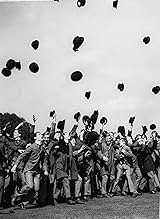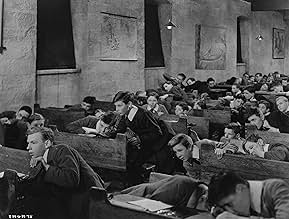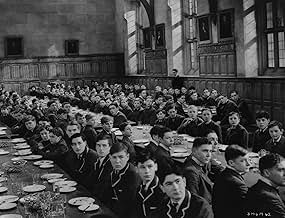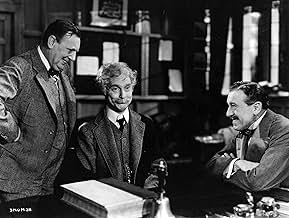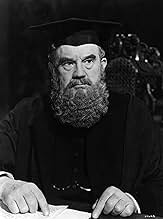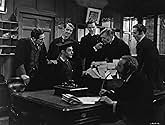VALUTAZIONE IMDb
7,9/10
12.089
LA TUA VALUTAZIONE
Un anziano insegnante ed ex preside di un collegio ricorda la sua carriera e la sua vita personale nel corso dei decenni.Un anziano insegnante ed ex preside di un collegio ricorda la sua carriera e la sua vita personale nel corso dei decenni.Un anziano insegnante ed ex preside di un collegio ricorda la sua carriera e la sua vita personale nel corso dei decenni.
- Regia
- Sceneggiatura
- Star
- Vincitore di 1 Oscar
- 6 vittorie e 8 candidature totali
Paul Henreid
- Staefel
- (as Paul Von Hernried)
Edmund Breon
- Colonel Morgan
- (as Edmond Breon)
Ernest Blyth
- Austrian Officer Boarding Train
- (non citato nei titoli originali)
John Blythe
- Boy Calling Assembly
- (non citato nei titoli originali)
Recensioni in evidenza
10Pelrad
"Mr Chips" is a celebration of the teaching profession. "Chips" finishes teachers' college in England and is almost run over by the students his first day teaching. But he learns how to balance good teaching with the right amount and kind of discipline in order for his students to be guided into a good education. However, he is somewhat shy and almost always in earnest.
"Chips" takes a vacation and meets a woman while doing some hiking. She is his perfect match and they fall in love and marry and she helps him to come out of his shell. He begins cracking jokes that have the students rolling on the desks with laughter. The couple become more than just educators; they begin to care for the children in many other ways.
The film follows "Chips" throughout his growing old. He gives the children morale and courage during the horrors of the War. "Goodbye, Mr. Chips" shows the beauty and rewards of the teaching profession, though it can be very difficult at times. Robert Donat gives one of the greatest acting performances in history. Brilliant! (10 out of 10)
"Chips" takes a vacation and meets a woman while doing some hiking. She is his perfect match and they fall in love and marry and she helps him to come out of his shell. He begins cracking jokes that have the students rolling on the desks with laughter. The couple become more than just educators; they begin to care for the children in many other ways.
The film follows "Chips" throughout his growing old. He gives the children morale and courage during the horrors of the War. "Goodbye, Mr. Chips" shows the beauty and rewards of the teaching profession, though it can be very difficult at times. Robert Donat gives one of the greatest acting performances in history. Brilliant! (10 out of 10)
10uds3
In the top TEN films of all time, I want to believe that Mr Chips exists for all school-children, that his spirit still hovers around places of learning waiting to guide those who might follow his lead as to decency, strength of character, gentility of nature and spiritual purity. Alas, Mr Chips is not required in 2001!
This film, the story of a gentle English teacher at a British Boarding school, is so timeless and emotionally involving, I find it hard to write about it without having to control my own feelings. Not a wuss by one hell of a long shot, and having last openly cried probably the last time I saw this film, I can only say that exposure to Robert Donat's performance here in the role which won him the most deserving of Academy Awards, is perhaps one of the greatest things can happen in your life. If you think I might be exaggerating, do me a favor - don't watch it! If you watch it and aren't moved, especially when his wife dies, then your life is meaningless!
GOODBYE MR CHIPS is probably the most beautiful film of all time and is a reminder of what we are all really here for. It's not that new pair of trendy shoes, the Rolex, the yellow drop-top with twin exhaust, that sharp Armani suit, the Chanel parfum, the 50,000 shares you picked up for a song last week, your blonde-tipped rinse, Nike shoes or $100 tie.....its for what Mr Chips STOOD for in 1939...and I got news for you, he's still here with his text-book open at the next lesson!
This film, the story of a gentle English teacher at a British Boarding school, is so timeless and emotionally involving, I find it hard to write about it without having to control my own feelings. Not a wuss by one hell of a long shot, and having last openly cried probably the last time I saw this film, I can only say that exposure to Robert Donat's performance here in the role which won him the most deserving of Academy Awards, is perhaps one of the greatest things can happen in your life. If you think I might be exaggerating, do me a favor - don't watch it! If you watch it and aren't moved, especially when his wife dies, then your life is meaningless!
GOODBYE MR CHIPS is probably the most beautiful film of all time and is a reminder of what we are all really here for. It's not that new pair of trendy shoes, the Rolex, the yellow drop-top with twin exhaust, that sharp Armani suit, the Chanel parfum, the 50,000 shares you picked up for a song last week, your blonde-tipped rinse, Nike shoes or $100 tie.....its for what Mr Chips STOOD for in 1939...and I got news for you, he's still here with his text-book open at the next lesson!
A lot of people were mystified that Clark Gable did not win the Oscar for "Gone With The Wind", but as good as he was, he had to play 2nd fiddle to Robert Donat for his amazing performance as Mr. Chipping in "Goodbye Mr. Chips". His was one of the really great acting achievements, and certainly the best he ever did. One has to wonder if ill-health had not shortened his life, just how many more Awards he would have got - but then not many roles like Mr. Chips came along. In what was one of her very early roles, Greer Garson made a lovely Mrs. Chipping - just right for this. Ably supporting was Paul Henreid and Terry Kilburn, but Donat shone like a beacon. The atmosphere of that gentle time in England was well captured by Sam Wood, and this truly is a film for film buffs to really enjoy. If you can get it on DVD or Tape, do so.
Director Sam Woods (`Kitty Foyle: The Natural History of a Woman,' `King's Row,' `For Whom the Bell Tolls') 1939 film `Goodbye Mr. Chips' features a top-notch performance by Robert Donat as the somewhat stuffy English prep school teacher, Mr. Chippings. Chippings early career difficulties are overcome, as is his shyness after he meets Greer Garson (`Mrs. Miniver') in the Alps while on holiday. Garson is able to show the stodgy Chips how to live life and her effect on him lasts throughout the rest of his life, although Garson is not around for long.
The film uses recurring patterns to show the passage of time, namely the showing of the boys arriving at the school each year in the autumn. These segments often contained little historical snippets between the boys, such as `we now have telephones, do you know how to use one?' and mention of Queen Victoria's death and the remark that `it is going to be strange to have a King.' Other historical comments occurred between the teachers such as the remark on a book by a new author, H.G. Wells and how he will never last because his writing is too fantastic. Sadly, Chip's historical error occurs when he comments to the boys that they will not have to go off to World War I as the war cannot possibly last more than a few weeks. So many of the teachers and students end up losing their lives in the Great War. Some other scenes from this film have been parodied through the years in comedies, most noticeably the scenes in the great hall when the headmasters are speaking to the boys is sent up hilariously by John Cleese in `Monty Python's the Meaning of Life' and the scene where Chips canes an insolent student (it is filmed as a shadow against the wall) is later parodied when a punisher is reprimanded for whipping the shadow, not the victim (my memory is failing me here, but I think this is in 1969s `Take the Money and Run' by Woody Allen, I could be wrong as a part of me also thinks that this could be in Mel Brooks' `Blazing Saddles.')
Donat aptly handles the complex role of Chips through the years, from about his mid-20s until his 80s. This may be one of the earlier movies that so aptly chronicles the life and times of a person through such an expanse of years, Dustin Hoffman in `Little Big Man' also performs n this manner, as does Al Pacino in `The Godfather Trilogy,' albeit over the length of three long movies. Even more outstanding and interesting about Donat and his character is that he covers so much of a common man's existence; Chips is a teacher, not a King, general, messiah or Mafia chieftain.
The film uses recurring patterns to show the passage of time, namely the showing of the boys arriving at the school each year in the autumn. These segments often contained little historical snippets between the boys, such as `we now have telephones, do you know how to use one?' and mention of Queen Victoria's death and the remark that `it is going to be strange to have a King.' Other historical comments occurred between the teachers such as the remark on a book by a new author, H.G. Wells and how he will never last because his writing is too fantastic. Sadly, Chip's historical error occurs when he comments to the boys that they will not have to go off to World War I as the war cannot possibly last more than a few weeks. So many of the teachers and students end up losing their lives in the Great War. Some other scenes from this film have been parodied through the years in comedies, most noticeably the scenes in the great hall when the headmasters are speaking to the boys is sent up hilariously by John Cleese in `Monty Python's the Meaning of Life' and the scene where Chips canes an insolent student (it is filmed as a shadow against the wall) is later parodied when a punisher is reprimanded for whipping the shadow, not the victim (my memory is failing me here, but I think this is in 1969s `Take the Money and Run' by Woody Allen, I could be wrong as a part of me also thinks that this could be in Mel Brooks' `Blazing Saddles.')
Donat aptly handles the complex role of Chips through the years, from about his mid-20s until his 80s. This may be one of the earlier movies that so aptly chronicles the life and times of a person through such an expanse of years, Dustin Hoffman in `Little Big Man' also performs n this manner, as does Al Pacino in `The Godfather Trilogy,' albeit over the length of three long movies. Even more outstanding and interesting about Donat and his character is that he covers so much of a common man's existence; Chips is a teacher, not a King, general, messiah or Mafia chieftain.
The children attending the Brookfield school are no ordinary English boys; they are the the children of the upper classes of society, who for generations have learned from institutions such as the school represented here. They are molded at places like this fictional one to be leaders of their country. Mr. Chipping is a teacher who gives his life to Brookfield, only to be bypassed when promotions are handed out. His love for the profession and his dedication to the formation of these children are his reasons for living. Most of his own life is spent at the school. Only in times of crisis is Mr. Chipps recognized. Mr. Chipps knows happiness only too briefly. He is extremely lucky when he finds Katherine. One can see the rapport in her, although we never see it explicitly on Chipping's face, maybe because a stiff upper lip that doesn't let him express his true feelings to a woman who adored him from their first encounter. Mr. Chipps lives long enough to learn about the death of his beloved students in several world conflicts. As a father figure, his life is full because the love and admiration the young boys feel for him. The film made Robert Donat a favorite of the movie going public. Mr. Donat goes from being a taciturn person into a jolly old man living on his own because Katherine dies young. The film improves tremendously when Greer Garson appears. Her luminous presence changes the tone of the movie because of her incredible charm. Paul Henreid makes a short appearance as Staefel, the fellow teacher who invites Mr. Chipps to accompany on a vacation trip to Austria. Sam Wood direction pays a close look to detail. The film is a classic and will live forever.
Lo sapevi?
- Quiz34-year-old Robert Donat ages 63 years (1870-1933) over the course of this movie. He remarked: "As soon as I put the mustache on, I felt the part, even if I did look like a great Airedale come out of a puddle."
- BlooperMiss Kathy tells Chips that the ballroom in Vienna is where Metternich drew up "the treaty of the five kings" (referring to the Congress of Vienna in 1814 ending the Napoleonic Wars) "nearly 100 years ago." But the montage after Kathy's death makes clear she died before the Boer War (1899) and Queen Victoria's funeral (1901). 100 years after the Congress of Vienna was 1914, the start of World War I when Chips becomes acting headmaster, and Kathy is spoken of as having died long ago.
- Citazioni
[dying words]
Mr. Chipping 'Mr. Chips': I thought I heard you saying it was a pity... pity I never had any children. But you're wrong. I have. Thousands of them. Thousands of them... and all boys.
- ConnessioniEdited into Hollywood: The Dream Factory (1972)
- Colonne sonoreBrookfield School Song
(uncredited)
Music by Richard Addinsell
Lyrics by Eric Maschwitz
Performed by orchestra in opening credits
Sung by male chorus during school assembly and during closing credits
I più visti
Accedi per valutare e creare un elenco di titoli salvati per ottenere consigli personalizzati
Dettagli
- Data di uscita
- Paesi di origine
- Lingue
- Celebre anche come
- Goodbye, Mr. Chips
- Luoghi delle riprese
- Repton School, Repton, Derbyshire, Inghilterra, Regno Unito(Brookfield School)
- Azienda produttrice
- Vedi altri crediti dell’azienda su IMDbPro
- Tempo di esecuzione
- 1h 54min(114 min)
- Colore
- Proporzioni
- 1.37 : 1
Contribuisci a questa pagina
Suggerisci una modifica o aggiungi i contenuti mancanti


